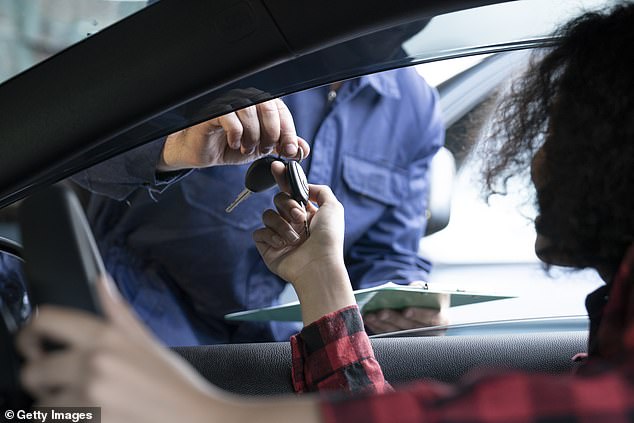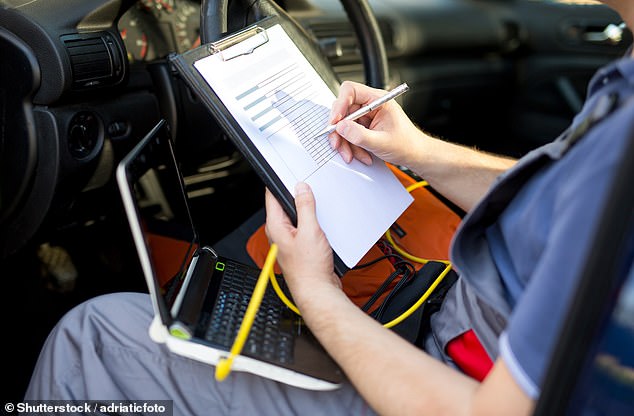Taking your car to the garage for a service or repair is never fun. It’s inconvenient, time consuming and quite often, costly.
It can also be a source of confusion as many non-petrolheads feel out of their comfort zone talking about a machine they may drive, but not know the mechanics of.
Without the same knowledge level as the garage, or full knowledge of your legal rights, it’s easy to feel on the back foot and that you are ripe to be ripped off.

Always tell you garage in writing what work you want them to complete, being as specific as possible
But a basic understanding of the law and knowing the key dos and don’ts will help you get ahead.
Here’s what you need to know before taking your car in for its next repair or service…
Express terms: Tell the garage what you want and stipulate a timeline
Before you get any work done tell the garage what you want. These instructions are called ‘express terms’.
Whenever possible put these express terms in writing. It makes it much easier if there’s a later dispute or query over work.
You can more generally say an overarching wish such as; ‘the car’s not starting properly and it’s cutting out when it does run; please can you fix this for me’.
But being as specific as possible and relating the instructions to a particular fault (or faults) that need fixing is best.
For example, this could be ‘fit new spark plugs’
Better yet if you can specify the brand required for different parts, but it’s not a necessity. You can also stipulate if you’re happy with good condition second hand parts or not.
The more general you are with the repairs – giving authorisation to carry out whatever’s necessary – the harder it will be to dispute later.
If you need your car back for a particular date or time then make that clear, but give the garage a decent amount of time to get the work done.

Ask for a written quote and don’t be British about talking money!
Implied terms: What should be a given
‘Implied terms’ are the background assumptions that repairs should be carried out with care, skill and within a reasonable period of time.
Parts should be good quality and well-fitted and match the description given.
These are your base legal rights we’ll come to later.
Ask for a written quote
Don’t commit without getting a written quote – that’s the hard rule.
The quote should cover roughly how much it will cost to fix your car and the timeline.
If the garage doesn’t volunteer this then make sure you request it before agreeing for work to commence.
You can also set a written spend limit with the garage, which they cannot exceed without contacting you first and getting your authorisation.
Sometimes the garage can only give an initial estimate to look over the car and access what needs to be done.
Don’t expect this to be done for free but make sure they ring or email you once they’ve diagnosed the issue and get your permission to continue work as per the updated estimated.

Ask around at different garages to get quotes because each garage will have its own labour costs, overheads and parts pricing so estimates can differ
Get multiple quotes
Like when you’re getting building work or plumbing work done, multiple quotes is the smart way to go when your car needs repairing.
Hourly labour rates vary, as do business overheads and the price of parts, so different garages will quote different amounts.
Ask the garage what hourly rate they charge – don’t be British about it!
Go to a few different garages to gauge a fair price and then decide based on price. Or, if there’s not much in it, the deciding factor might be reputation or specialist skillsets offered.
How binding is a quote?
A quote is usually only an estimation of the price and therefore isn’t binding. You could end up paying a bit more or if you’re lucky a bit less, but it should be roughly what was stated.
Sometimes you can it priced exactly and contracted firmly, but this is pretty rare and usually for very particular work.

The garage can diagnose and then legally charge for additional extra work that’s needed if you don’t ask for a quote
No quote? What’s a reasonable price?
If you don’t get a quote, then a garage is legally within its rights to charge you a ‘reasonable’ price for any and all work that’s completed to a good standard.
The law of the land: your base rights to be aware of
As a customer taking your car in to be serviced or repaired, you are protected in law by your consumer rights.
Overarchingly these include:
- The garage has to charge a reasonable amount if a price isn’t agreed beforehand;
- They have to fit replacement parts that are in good condition, up to doing the job and will last a decent length of time;
- They have to use reasonable care and skill and do the work in a reasonable timeframe.
Authorisation:
- If the garage carries out work you haven’t authorised then they aren’t entitled to claim payment for this work;
- If parts were replaced without authorisation the garage should remove these parts and re-fit the old parts. If they can’t do this then the garage needs to swallow the cost.
Delays
How long is a piece of string?
Car repair delays are pretty commonplace because there are so many variables.
From previously unseen faults to parts shortages there are quite a few reasons why motors can take their sweet time to be fixed.
However, if you’ve set a time period and the garage is way off then you have options:
- Initially try and fix a new completion date
- Ask the garage for a courtesy car
- If you’re hiring a car then tell the garage because you might be able to claim the extra cost of car hire
- You can take the car back if it’s road legal and safe, and bring it back in again for the extra work to be done at a later date

If you want to dispute work, start by talking to the garage clearly and calmly, and only turn to legal proceedings as a last resort
Disputing work and whether you get your car back
If you aren’t satisfied with the repairs carried out, then start by talking to the garage about this.
Legal proceedings are costly, time consuming and difficult so always a last resort.
You can also get another garage to examine it.
If the garage isn’t playing ball, then you can see if they belong to a trade association and if so, ask the association for help.
The garage has the right to keep your car until they’ve been paid for all the work done.
Unless you are going through legal proceedings, then you will need to pay the bill but write on the garage’s copy ‘paid under protest’. This lets you get your car back but continue to challenge the garage.
In this case you can give written notice to the garage that you intend to take your car to other garages to get quotes for fixing the faults, and will be charging the additional cost back to the garage at fault.
If you’ve taken your car back and paid only to have spotted new problems or faults, the garage is liable, but you’ll have to prove that it’s a related issue caused by the garage.
Sadly it could just be a coincidence.
Arbitration and going to court – the last resort
Hopefully it doesn’t come to this but, if all else fails, then you can either go through the trade association and use arbitration or take the garage to court.
Most trade associations offer a low-cost arbitration service which brings in an outside investigator to rule in favour of either the garage or car owner.
There are a few snags with this method: the garage must agree to it, the decision’s binding so you can’t dispute it later and you don’t get the fee back if you lose.
If you decide to go to court, then you don’t need a solicitor for claims under £3,000 and can go through Small Claims Court.
If the repair bill is more than £3,000 then you will need a solicitor to advise you.
Some links in this article may be affiliate links. If you click on them we may earn a small commission. That helps us fund This Is Money, and keep it free to use. We do not write articles to promote products. We do not allow any commercial relationship to affect our editorial independence.











